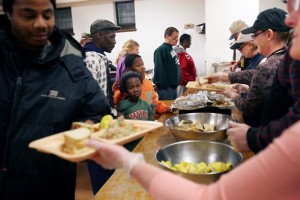Weekly Objectives and Achievements:

This week, one of our objectives was to create awareness around the degree of food waste surrounding the hospitality industry, and the other was to gather more information on the hospitality service and what happens to leftover foods. We achieved, to some extent, our first goal by presenting our project proposal to the class and showing them visual evidence that portrayed the amount of untouched leftovers that would be going to waste. We also greatly achieved our second goal this week by gathering pieces of very useful information; we discovered Bill 10, which states that a person, employee or volunteer providing assistance to a corporation who donates or distributes donated food “is not liable for damages resulting from injuries or death caused by the consumption of the food, unless the food was adulterated, rotten or otherwise unfit for human consumption,” and this signifies that we do not need to worry about stakeholders being discouraged about joining our program due to liability issues (BC Laws, 2015). We also discovered, through informal interviews with professional chefs, that sometimes organizations in charge of picking up surplus food do not commit to do so, and this was a very significant find which leads us to our next section.
What:
In previous occasions, establishments were donating their leftover surplus food, which included perishable foods such as mashed potatoes. However, there was no consistency regarding pick-up times by the food runner program. In other words, the scheduled pick-up time was not always met and restaurants were left with food that was taking up space in their warmers or their freezers. This made them hesitant to keep participating in the program.
So what:
There needs to be more research done behind why food runners are being inconsistent with their pick-up. We need to find out if this is a resource issue (not enough trucks, volunteers to drive the trucks and make the meals when the food arrives), an organizational issue, or a space issue (kitchens at the food bank can only hold so much food at one time).
Now what:
In order to find out this information, we will interview the Greater Vancouver Food Bank’s Angel Food Runners Program to determine the reason behind their inconsistent pick-up times. Depending on the answers provided by the Food Bank, we will try to determine a solution to their problem, as presented in the session 6 podcast. We will first apply the principles of community based program development, by determining the reasons why the project does not expand and hasn’t been fully successful in the past, and then building on the resources they have to expand them and make them more productive. Some of the reasons might include; lack of infrastructure, low volunteer count and lack of demand towards perishable donated food either caused by a surplus or personal choice.
Upcoming Objectives and Strategies:
Our upcoming objectives include setting up interviews with stakeholders, including the Angel Food Runners Program, 2 to 3 hotels/convention centres and 1 to 2 similar food donation programs. We will do this through email and/or phone calls to set up a time for an in-person interview. To prepare for the interviews, we will formulate questions applicable for each stakeholder in order to ensure that we collect all relevant information in order to expand our project.
Works Cited
BC Laws (2015). Food Donor Encouragement Act. Retrieved from
http://www.bclaws.ca/Recon/document/ID/freeside/00_97008_01